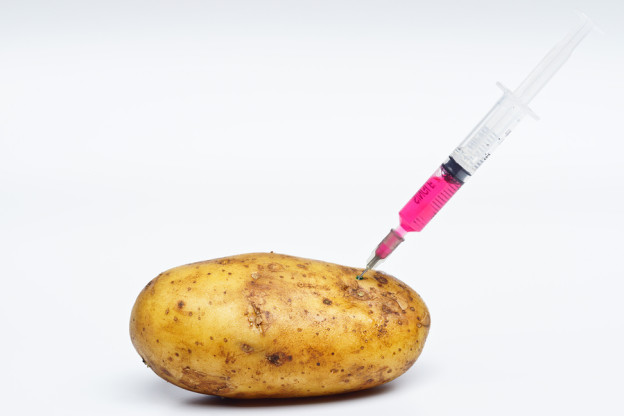By David Blyweiss, M.D., Advanced Natural Wellness
January 15, 2021
There’s no doubt modern science can do some pretty fantastic things…
Just look at our recent advancements in space science or the newest vaccination for COVID-19. With the right amount of funding and enough brains in action, we can achieve greatness.
But sometimes those advancements aren’t for the best. Just look at the recent rapid rise in genetically modified organisms (GMO).
I’ve watched this growing trend with great concern over the last few years.
Sure, farmers want the help of scientists so they can grow bigger, more profitable crops.
But what happens when scientists make changes to our food source without fully understanding the health risks involved?
Well… big problems, that’s what.
In case you’re not familiar, a genetically modified organism is one where genes are taken from one species and placed into another. For instance, they might take genes from bacteria or viruses and force them into the DNA of a crop like soybeans or corn plants.
Oftentimes, the genetic changes made to these crops help the plant resist toxic herbicides and pesticides that keep off bugs and crop destroying insects.
These GMO foods have been sneaking into our diets since 1995. This is when the Environmental Protection Agency (EPA) first analyzed a new form of corn.
Are genetically modified foods safe?
Open your arteries, improve blood flow for a new health miracle...
Did you know your circulatory system has over 60,000 miles of arteries, veins and other blood vessels, if stretched end to end?
But as you age, your blood vessels undergo changes, which may cause them to stiffen, thicken and get clogged.
GOOD NEWS! Doctors have now identified a “Miracle Molecule” inside your arteries that helps OPEN your arteries and IMPROVE blood flow.
It’s what Dr. Valentin Fuster calls it, "One of the most important discoveries in the history of cardiovascular medicine."To you, that means...
- Healthy blood pressure
- Sharper mind and memory
- Skyrocketing energy and muscular strength
- Increased pleasure and passion in the bedroom
- Improved circulation to every cell and organ in your body
Go here to discover a new natural way to significantly boost the levels of this miracle molecule in YOUR body NOW!
It depends who you ask. The companies who make and own GMO foods say “yes.”
These same companies have refused to allow independent testing of any kind. Let me say that again, they’ve refused independent studies on their genetically modified foods. Still the US Food and Drug Administration (FDA) has approved the foods for sale.
Today, more than 85% of crops in the United States are grown with genetically modified seeds. 80% of the processed food items in your local supermarket contain GMO ingredients.
That should alarm you in a big way…
Back when this technology first emerged, FDA scientists warned that genetically modified foods could create allergies, toxins, new diseases, and even nutritional problems.
But the person in charge of the policy at the FDA turned a blind eye to these warnings. That’s because this person also happened to be closely involved with a company called Monsanto.
Remember how I told you that GMO crops are engineered to resist herbicides?
Well, one of the most widely used herbicides is sold by the Monsanto company. It’s called glyphosate. You might know it by its more common name, Round-Up.
The “Old One-Two Punch” Problem with Our Food Supply
So, when we’re talking about the problem with GMO foods, there are actually two things to consider.
First, I’ve already talked to you a great deal about the health risks associated with glyphosate on our crops. Most GMO foods are engineered so they can be resistant to these chemicals. That means GMO crops are sprayed liberally with the poisons, so they end up on your dinner plate as well.
One article says, “Roundup was by far the most toxic among the herbicides and insecticides tested.”[1]
Glyphosate will:
- Kill off the good bacteria in your gut wreaking havoc on your gut microbiome.[2]
- Interfere with how your body uses important minerals like cobalt, iron, and manganese.[3]
- Disrupt your body’s production of amino acids it needs.[4]
- Contribute to a dangerous form of cancer called non-Hodgkin’s lymphoma.
Then, we have to worry about the actual health problems that come when we mess around with the DNA of our food crops.
The World's Quickest Solution for Ending Prostate and Urinary Misery
This has recently been revealed to be one of the only real breakthroughs in prostate health.
The seeds of a strange fruit (sometimes called "Chinese Apples") hold powerful phytonutrients that are a revolution in prostate health.
In fact, UCLA and Veterans Administration research have now proved this to be true.
Not only that, but it may be the worlds quickest solution for ending prostate misery.
Simply stated, these phytonutrients represent a huge step beyond beta sitosterol, saw palmetto, and other phytosterols alone.
Simply click HERE if you want to have fast prostate relief...restful, uninterrupted sleep...no more constant "urges to go"...enhanced virility...and optimal prostate support for life.
GMO foods are made mostly by six chemical companies. They include Bayer (originally Monsanto), Corteva a spin off the Dow/ DuPont break up, BASF, and Syngenta bought by ChemChina in 2015, and collectively, they’ve spent tens of millions to block consumers from getting information on food labels.
This means you never know whether a food you buy in the store contains GMO foods or not.
I think that everyone has the right to know this important information. That’s because a great many health concerns are linked to GMO foods.
A review of available animal studies shows that GMO food is linked to infertility, immune problems, accelerated aging, organ damage, and gastrointestinal problems.
Then, lab animals who are fed GMO crops displayed a range of problems. They had damaged organs, higher infant mortality, smaller babies, organ lesions, signs of toxicity, potentially precancerous cell growth, massive tumors, early death, sterility, and birth defects.[5]
More investigations link GM feed with livestock sickness and death. Then, thousands of farm workers who handle GM cotton plants have reported rashes, itching, and allergic reactions.[6]
It all comes down to this…
Scientists are playing with fire when they genetically modify organisms. They don’t know all of the ways these new crops could harm humans.
For instance, there’s a specific gene in corn that causes an allergic reaction in most people. Normally, this gene is switched “off” in natural corn.
But when scientists genetically modified the corn, the allergy gene was switched back “on.” The genetically modified corn also had 43 different proteins that were very different from the natural corn. This can cause a wide range of unknown problems in your body.[7]
Levels of human allergens were also increased in GM soy crops by seven times![8]
Then, some FDA scientists worry that our uncontrolled use of GMO crops might contribute to the release of antibiotic resistant bacteria into our general population.
Research has found that herbicides (Roundup® was initially brought out as an antibiotic) often used on GM crops can cause antibiotic resistance.[9]
Overall, these GMO foods are bad news. No long term human studies have been conducted to report the effects of GM foods.
Then, very few safety studies are funded by biotech companies. These studies are often widely criticized as rigged to cover up problems.
When independent scientists actually do discover problems, they are typically attacked, threatened or fired.
Protect Yourself by Eating Organic
One of the best ways you can avoid eating GMO crops is to immediately start buying organic foods. Start with the most important fruits and veggies and work your way up.
The Environmental Working Group (EWG) is a non-profit organization that releases a report each year. In their report, they list their “Dirty Dozen” — those crops that give you the greatest risk of chemical poisoning.[10]
Remember, by human standards, GMOs are very new to our world. Humans have been around for a very long time and we’ve now, just post WWII, introduced more than 80,000 unnatural mixes of compounds with no idea of the long term harm.
That’s why many of us want our foods to be labeled so we can decide for ourselves what is best for human consumption. But, until labeling is required by law, I strongly suggest you buy organic fruits and vegetables.
Sources:
[1] Article ID 179691*R. Mesnage et al., Biomed Research International, Volume 2014 (2014)
[2] Samsel, Anthony, and Stephanie Seneff. “Glyphosate, pathways to modern diseases II: Celiac sprue and gluten intolerance.” Interdisciplinary toxicology vol. 6,4 (2013): 159-84. doi:10.2478/intox-2013-0026
[3] Robert J. Ganson, Roy A. Jensen,The essential role of cobalt in the inhibition of the cytosolic isozyme of 3-deoxy-d-arabino-heptulosonate-7-phosphate synthase from Nicotiana silvestris by glyphosate, Archives of Biochemistry and Biophysics,Volume 260, Issue 1,
[4] Vivancos, Pedro Diaz et al. “Perturbations of amino acid metabolism associated with glyphosate-dependent inhibition of shikimic acid metabolism affect cellular redox homeostasis and alter the abundance of proteins involved in photosynthesis and photorespiration.” Plant physiology vol. 157,1 (2011): 256-68. doi:10.1104/pp.111.181024
[5] Dona, Artemis, and Ioannis S. Arvanitoyannis. “Health risks of genetically modified foods.” Critical reviews in food science and nutrition 49.2 (2009): 164-175.
[6] Smith, Jeffrey M., and But Monsanto. “Dangerous Toxins From Genetically Modified Plants Found in Women and Fetuses.” Responsible Technology (2011).
[7] Zolla, Lello, et al. “Proteomics as a complementary tool for identifying unintended side effects occurring in transgenic maize seeds as a result of genetic modifications.” Journal of proteome research 7.5 (2008): 1850-1861.
[8] Stephen R. Padgette and others, “The Composition of Glyphosate-Tolerant Soybean Seeds Is Equivalent to That of Conventional Soybeans,” The Journal of Nutrition, vol. 126, no. 4, April 1996 (The data was taken from the journal archives, as it had been omitted from the published study.)
[9] uKurenbach B et al (2017). Herbicide ingredients change Salmonella enterica sv. Typhimurium and Escherichia coli antibiotic responses. Microbiology, 17 November 2017. doi: 10.1099/mic.0.000573
[10] Environmental Working Group, “Dirty Dozen,” 2020. Available online: https://www.ewg.org/foodnews/dirty-dozen.php







